Matthew Dicks's Blog, page 254
November 29, 2017
Dan Kennedy is right. Reach out to people whose work means the world to you.
Dan Kennedy, writer, storyteller, and Moth host, tweeted earlier this week:
(@DanKennedy_NYC) Gonna get better at sending notes to people whose work means the world to me. Feels fanboy, but beats waiting to send an RIP tweet.
I like this advice a lot.
I receive emails, tweets, and Facebook messages almost daily from readers around the globe who have liked my books and/or have questions about my stories. Every time I receive one of these messages, my heart skips a beat and I find myself more excited than ever about writing.
It occurs to me:
Despite all of this generosity from my readers, I've never followed their example and done the same.
In short, I'm a jerk.
Dan says that reaching out to people whose work I love feels a little fanboy, and perhaps that's why I've hesitated from doing so in the past.
That, and I really am a jerk.
But as a daily recipient of these messages from readers - this morning from a teenage girl in Newberg, Oregon - I can assure Dan and everyone else that it doesn't feel fanboy at all from the recipient's perspective.
It's a joy. A blessing. A spark that often arrives at the moment I needed it most.
Next month I begin deciding upon my goals for 2018, and I think this will be one of them. I will write to at least one person per month whose work I admire every month in 2018.
It's a good goal.
As a warm-up for 2018, I'll mention that Dan Kennedy - dispenser of this excellent advice - is someone who I admire a great deal.
I first heard Dan's voice back in 2008 when Elysha and I listened to his memoir Rock On: A Power Ballad together in the car. We loved that book. I listened to it again a few years later on my own.
I heard Dan's voice again in 2010 on The Moth's podcast. Each week he delivered new stories to my ears.
In July of 2011, I met Dan for the first time when I took the stage at the Nuyorican Poets Cafe and told my first story for The Moth. By then he was an icon in my mind. I couldn't believe I was standing beside him. Dan hosted my first Moth GrandSLAM a few months later (I lost to Erin Barker, someone else who I admire deeply and will probably write to in 2018), and then slowly, over the years, I've gotten to know him better and better as I attended and performed in more and more Moth events.
Eventually we performed together on The Moth's Mainstage. I listened to him tell stories for the first time about the death of his therapist and his ill-advised trip to find an enormous snake, and I was blown away. Those stories are still trapped inside my heart.
Dan is a brilliant performer. An incredibly gifted storytelling host. A talented storyteller.
But it's Dan's most recent novel, American Spirit, that I love most. I listened to that book on the way back from Maine last year, and I have never laughed so much by myself. There are certain books that are so exquisite that you remember exactly where you were while reading or listening to them, and American Spirit is one of those books for me.
I will never forget that too-bright sun, that impossibly blue sky, the blessedly open road, and Dan's voice, making the miles melt away.
It's a hilarious, poignant, brilliant book. You should read it.
Thank you, Dan, for sharing the book and your voice with the world.
I hope this doesn't feel too fanboy.

November 28, 2017
How can you possibly have so many stories?
It's a question I get a lot. Whether it's stories that I'm sharing on the golf course or at the dinner table or on the stage, I always have a new story to tell.
A small part of this is the unusual life that I've led, filled with chaos, bad luck, and at times, disaster. My friend and the Artistic Director of The Moth Catherine Burns has said to me, "You either have a good time or you have a good story."
A much larger part of it is the system that I use to find stories in my life called Homework for Life. People who use my system with fidelity and rigor find themselves awash in stories about their lives. It works.
But having many stories to tell also has a lot to do with the understanding that a story is not always a series of fantastic events or shocking developments. You need not move mountains to have a great story to tell. A story can be small. Infinitesimal, really, if it speaks to something about your heart, reflects your experience as a human being, or offers some fundamental truth about who you are.
That's why I love Bill Bernat's story "Oreo Relapse," which was featured on The Moth Radio Hour last week. Bill's entire story - more than five minutes long - takes place in a grocery aisle as he tries to decide if he will purchase a bag of Oreo cookies and thus fall off his dietary wagon.

That's it. If I were to summarize the story, I would say, "Man battles his inner cookie demons as he tries to decide if he should purchase a bag of Oreos."
And yet the story is filled with humor and heart. It speaks to something universal in all of us:
The power of temptation. The fragility of will power. Our constant inner battle of right vs. wrong. The shame of not having full control over our desires.
Bernat's story is brilliant in its simplicity. Very little happens in the story, yet when he is finished, I feel like I have been offered an honest, unflinching look at the man's soul. I feel connected to the man. I love the guy.
I don't know Bill Bernat, but I bet he has lots and lots of stories to tell.
"Nothing interesting ever happens to me."
"My life is boring."
"Nothing too terrible has ever happened to me."
Refrains I hear all the time to would-be storytellers who worry that unless you've died on the side of the road or been arrested for a crime you didn't commit or lived on the streets, you won't have any good stories to tell.
Not even close to true.
If you are willing to speak honestly, embrace vulnerability, think introspectively, and share a part of you that most would not normally share, you will have more stories than you could ever imagine.
Do your Homework for Life.
Listen to Bill Bernat's story.
Become the person who always has a new story to tell.
November 27, 2017
Things I do #11: I get angry at the other versions of me.
Assuming that the theory of the multiverse is correct, I often find myself angry at the other versions of me that live in alternate timelines where Trump is not President and the world still makes sense.
Not "Ha! Ha!" angry.
Seriously angry. Legitimately angry.

November 26, 2017
5 things that you can do to help me sell books (and one unusual thing that I do)
A reader named Sarah sent me this photo with the accompanying message:
"My friend wanted to go Black Friday shopping and I couldn't help manipulating this shelf."
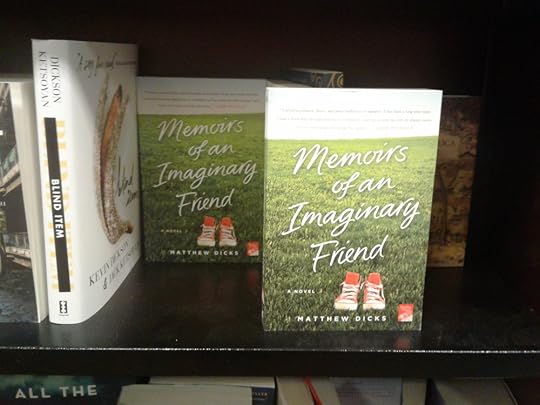
It means a great deal when a reader helps me sell books. In addition to this rogue redesign of the shelf so that my books are facing out, there are a few other things you can do to help an author:
1. Buy the book. Don't wait for a copy to be available in the local library. Just buy the damn thing. I can't tell you how many people - friends and family included - who have told me that they can't wait to read my book just as soon as it's returned to the library.
Buy the book. Please. Or at least tell me you did.
2. Give the book away as a gift. Books are easy to wrap and make outstanding gifts. In the case of my books, I invite readers who don't live locally to forge my signature so that they can give a prized "signed copy" as a gift.
I'll never tell.
3. If you discover that a bookstore is not carrying an author's titles or has run out of an author's books, mention the book and/or author to one or more of the employees. Tell them about the book. Tell them about the author. Tell them that they lost a sale today by not having the book available.
4. Preorder the author's next book. I'll be asking you to do that shortly for one of my upcoming books. Preorders help to boost production orders and increase the chances of a book landing on bestsellers' lists during its first week in print.
5. Leave a review on Amazon, Barnes & Noble, Goodreads, or all of them. It takes just a minute to rate a book and offer a review, but the benefits to the author are enormous.
This last thing won't help sell any books, but it will make an author feel good:
Write to the author if you loved the book. Just this week, I heard from readers in Guatemala, France, Mexico, and Florida. These emails mean the world to me. It's remarkable that a story once in my head is now being appreciated by people around the globe.
Stephen King calls it telepathy, and he's right. I had a thought, and now that thought is entering the mind of someone in Central America or Europe.
It's amazing.
This is the kind of thing that sends me back to the manuscript every day with enthusiasm and excitement.
Here's something unusual that I do with my books that has unintentionally increased sales:
I occasionally drop real people into my fictional worlds rather than inventing new characters. I'm not talking about starting with a person who I know and transforming then into a fictionalized version of themselves. I insert the entirety of a human being into my worlds, making no attempt to alter them from their real life version in any way, and this has oddly generated additional book sales.
In Memoirs of an Imagery Friend, Mrs. Gosk is an actual teacher and friend who I worked with for years before she recently retired. The Mrs. Gosk in the novel is exactly like the Mrs. Gosk in real life, right down the mentions of her husband and children. As a result, friends and fans of Mrs. Gosk have bought the book just to read about their friend
In The Perfect Comeback of Caroline Jacobs, a man named Eric Feeney makes a brief appearance on the first couple pages of the book. He's the most minor of characters imaginable, but Eric, a teacher in my school, has made the most of his fame. He has attended my book signing and offered to sign alongside me. He has directed friends, family, and complete strangers to purchase the book. He has even signed stock in bookstores after telling the booksellers that he is featured in the novel.
He's worked so hard that I'm looking to include him in the next novel in another very minor role.
Anything to increase the telepathy.
November 25, 2017
Cats and writers don't mix
The end of 2017 is a busy time for me.
I'm finishing my fifth adult novel.
I'm finishing my first middle grade novel.
I'm copyediting my nonfiction book on storytelling.
I'm not complaining (or trying not to, at least) because I know how fortunate I am to have three different publishers willing to pay me to write, but it's also like having three enormous homework assignments all due at the same time.
I'm spending a lot of time in front of the computer. Early mornings. Late nights. Weekends. Lunch breaks. I'm working hard. Often enjoying the work, as much as there is to accomplish.
But not everyone is helping me get the job done.
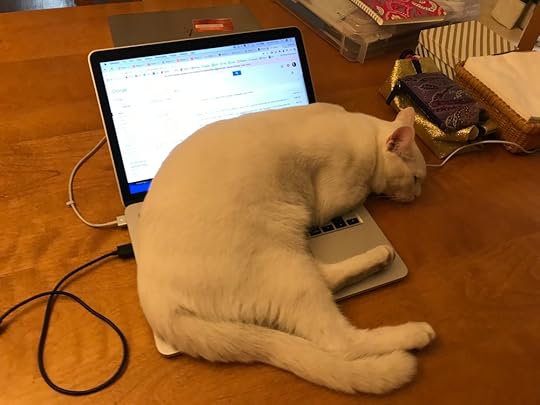



November 24, 2017
The wealthy are often playing an entirely different game than the rest of us.
I like this explanation of the difference between the wealthy, the middle class, and the poor a lot:
"Entrepreneurship is like one of those carnival games where you throw darts or something.
Middle class kids can afford one throw. Most miss. A few hit the target and get a small prize. A very few hit the center bullseye and get a bigger prize. Rags to riches! The American Dream lives on.
Rich kids can afford many throws. If they want to, they can try over and over and over again until they hit something and feel good about themselves. Some keep going until they hit the center bullseye, then they give speeches or write blog posts about "meritocracy" and the salutary effects of hard work.
Poor kids aren't visiting the carnival. They're the ones working it."

I'd add to this metaphor the following:
Rich kids also have the additional advantage of enormous safety nets to protect them before and after they play the game. Private schools and tutors to insulate against failure before ever throwing a dart and family businesses and inherited wealth to fall back on if they decide to stop playing the game altogether.
The Trump family is a perfect example of this.
Donald Trump is not a self-made man but the beneficiary of his father's immense real estate fortune. Incidentally, Fred Trump's real estate career was marked by investigations by the U.S. Senate for wartime profiteering and the Department of Justice for violating the Fair Housing Act for refusing to rent to African American tenants.
Not exactly a fortune earned through hard work alone.
The Trump children are all third generation beneficiaries of that fortune as well. They all work in the family business and have benefited from the free capital of the Trump fortune when launching businesses of their own.
No matter how many entrepreneurial darts Trump and his children threw, they would never be without wealth. Their family business served as an enormous safety net to failure, misfortune, or incompetence.
Even Ivanka Trump's wealthy husband, Jared Kushner, is the product of an enormous family fortune. He, too, works for the family business.
None of these people are self-made, boot-strapping, rags-to-riches people. They take credit for their wealth at every turn but are merely the stewards of a fortune that was amassed a long time ago.
In fact, economists have demonstrated that had Donald Trump merely placed his father's fortune in an index fund and done nothing, he'd be more wealthy than he is today.
Fred Trump went to the carnival in the second half of the twentieth century to try his hand at throwing darts. He probably cheated while playing the game and scored big, and the Trump family has been the beneficiaries ever since.
Are we surprised that the tax cuts currently proposed by Republicans vastly favor the wealthy while increasing middle class taxes?
Are we surprised that Trump and his wealthy supporters are hell bent on eliminating the inheritance tax?
Trump doesn't want to throw darts. He doesn't want to take any entrepreneurial risk. He and his wealthy supporters don't want to go anywhere near the carnival. Those darts were thrown long ago. They simply want to benefit from the risk taking and fortune building of their predecessors.
November 23, 2017
On this Thanksgiving, I choose to be thankful to Taryn.
I've made it an almost annual tradition to spend a portion of my Thanksgiving writing about the people, places, things and institutions to which I am thankful.
Last year, I chose to thank no one for a very specific reason.In 2015, I expressed my gratitude for possibility.In 2014, I listed 18 reasons that I was thankful.In 2013, I listed 17 reasons that I was thankful.I seem to have skipped 2012. Apparently I was lacking gratitude that year.In 2011, I was grateful for a skunk's willingness to allow bygones to be bygones.I was apparently lacking in gratitude again in 2010.In 2009, I was thankful for Chuck Klosterman's book Eat the Dinosaur.On this Thanksgiving, I'd like to give thanks to just one person:
My literary agent, Taryn Fagerness.
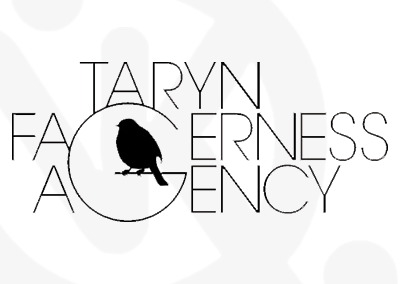
It occurred to me while writing the acknowledgements for an upcoming book that Taryn is directly responsible for making my wildest dreams become a reality.
This is no exaggeration.
When I was a boy, I dreamed of one day becoming an author. The writer of books. A person whose thoughts and ideas and stories would be of interest to others.
It was a ridiculous dream, of course. I wasn't given the opportunity to go to college after high school. At the age of 18, I was already on my own, living without a safety net, struggling to make ends meet. I was managing McDonald's restaurants, working 60 or more hours every week, constantly dreaming of bigger and better things.
But even so, I was writing. Since my senior year of high school, I have written every single day of my life without exception. In those early days this writing took the form of letters to friends, journal entries, zines, newsletters, and even a blog (though it would be years before "blog" would even become a word) on an early, localized version of the Internet called a BBS.
I wrote constantly. Still, I never thought my writing would amount to anything.
A few years later, I found myself homeless, jailed, and facing a possible prison sentence. I didn't have a penny to my name. My ridiculous dream of one day becoming an author now seemed utterly impossible.
Years later, after a lot of hard work, the impossible became possible again. I finally wrote my first novel. But it turns out that writing a book is only the first step. It's a huge step, to be sure, and worthy of celebrations, but without a champion of your books, it is likely that your stories will go unseen and unread by the world.
Enter Taryn.
Taryn was working at a large literary agency on the west coast in the summer of 2007 when she discovered my query letter and the first three chapters of my first novel, Something Missing, in the slush pile, alongside hundreds of other letters from hundreds of other hopeful, desperate writers. It was Taryn's job to read through these unsolicited submissions, searching for a diamond in the rough. She liked my query letter, and she liked my first three chapters, so she wrote to me and asked to see the rest of the book.
Other agents had made similar requests, but as the summer drew to a close, nothing had materialized. After sending letters to 100 literary agents, it looked like I'd be sending out my second batch of 100 letters before long.
Then, on the very last day of my summer vacation, Taryn called and said that she would like to be my literary agent.
There have been many important phone calls in my life, but as I look back on my life, Taryn owns the top three spots in my personal pantheon of life altering phone calls:
That night when she called and became my literary agentThe afternoon when she called to tell me that my first novel had sold to DoubledayA frantic, excited phone call she placed immediately after reading the first half of Memoirs of an Imaginary Friend, telling me that I had written something great.Each of these phone calls changed my life.
In each instance, Taryn changed my life.
Yes, it's true that my hard work was also required. I had to write the books. I spent 17 years of my life writing every single day before ever publishing a story. But Taryn has become the champion of my work, and that role cannot be overstated.
Taryn is not only my literary agent, but she is also my collaborator. My co-conspirator. My friend in words. Before an editor ever sees one of my books, Taryn sees it first, offering her advice on plot, characters, and story.
She makes my stories better. She makes my writing better.
Taryn is also directly responsible for the publication of my novels in more than 25 countries.
She is responsible for the film options on three of my novels.
When my third novel didn't sell and I thought my writing career was over, Taryn's words to me were perfect:
"You just need to sit down and write your best book ever."
It is no exaggeration to say that the relationship that Taryn and I have is the envy of so many of my author friends. They cannot believe my good fortune. While they often describe their literary agents as difficult-to-reach, slow-to-react, and less-than-supportive, Taryn is exactly the opposite.
I have often described our relationship like this:
Taryn and I own a company together that publishes books. We are partners in the creation and dissemination of stories. I admittedly own more shares in the company than Taryn, but the company would not operate without each one of us doing our job.
Taryn is my business partner. She is also my creative partner. She is also my friend. We stand together. We make stuff together.
On this Thanksgiving, I give thanks to Taryn Fagerness, a person who has made so many of my dreams come true. I have become the thing I never thought I could be.
I hope you are all lucky enough to find your champion. Your creative co-conspirator. Your dream-come-true maker.
November 22, 2017
I performed stand up comedy for the first time for one very important reason.
Last year, a friend asked me to try stand up comedy with him.
I said no and moved on with my life.
But knowing I had to follow my "Say yes to everything" philosophy, I called him back the next day and said, "Fine, I'll do it, but I won't like it."
We agreed that in addition to performing comedy, I wasn't allowed to simply tell a funny story. I have plenty of stories that could fill the five minute requirement and make people laugh throughout, but this had to be different. I had to tell jokes. Not stories.
I thought this was fair, but I was also terrified.
Almost a year to the day after declaring my intent, I took the stage on Monday night at Sea Tea Improv in downtown Hartford to perform stand up comedy for the first time.

It went well. I was not fantastic. I performed for the requisite five minutes, telling jokes about parenting, marriage, Jewish food, and sex. People laughed. A few people complimented my performance afterwards, and a couple more found me online the next day to offer positive feedback.
Most important, Elysha thought I was funny, and a couple friends in the audience were supportive as well.
A friend (but not the friend who challenged me to comedy in the first place) also took the stage on Monday and performed. He did well, too. As he pointed out later, some of the comics were asked by the host if it was their first time doing comedy.
Neither he nor I were asked that question. We were at least good enough not appear new.
But it was a strange experience, too. I took the stage without any real plan. I had a couple opening sentences which I knew I could use to launch me into a riff on the realities of being a father, but after that, I was winging it. I said funny things that came to mind, but immediately after saying them, I knew that there was an even funnier way to say them.
And I wasn't telling stories. I was telling jokes. Trying to make people laugh with words instead of story.
And for the first time in a very long time, I felt nervous as I took the stage. Those nerves evaporated after I began speaking, but for a few moments, I felt the nerves that so many of my storytelling students feel just before taking the stage.
I'll try stand up comedy again. I'll keep a running list of possible funny ideas as they occur to me, and when I think I have five minutes worth of material, I will prepare another set and give it a shot. Perhaps I'll take the five minutes that I did on Monday to another club as well. A producer at a comedy club in Manhattan has asked me to do 20 minutes at her club, and I could definitely stretch the 5 minutes that I did on Monday to a much longer set if I wanted.
But here is the important part about Monday night:
I tried something that was new, frightening, and hard. That is why I did it. Complacency is tragic. Monotony is death. The absence of new horizons is an unfulfilled, wasted life.
I cannot stress this enough: You must find and try things that are new, frightening, and hard. This is the elixir of youth. Days filled with excitement and anticipation. A life absent of regret.
As a child, my life was filled with things that fit all three of these categories. I took new classes in new subjects every semester. Played new sports. Changed schools. Learned to drive. Asked girls to dance. Hiked up new mountains. Swam in new ponds. Made new friends. Played new musical instruments. Learned to speak a new language. Had sex for the first time. Earned my first paycheck.
A young person's life is inextricably filled with things that are new, frightening, and hard. As we get older and experiences begin to pile up, those opportunities become fewer and farther between. People settle into routines. They establish patterns. Their zeal for risk taking wanes.
Before long, they cannot imagine trying something new, frightening, and hard. They become set in their ways. They plod through life. They can't imagine staying up all night or driving to some faraway place on a whim or otherwise disturbing their routines.
They are getting older while getting old.
I say yes to everything because I don't want to get old as I get old. I want the promise of days that are new and frightening and hard. I want to know that what I know now will not be all that I ever know.
I cannot recommend the new, frightening, and hard enough. Stay young before you get old.
November 21, 2017
Bad boy and breakfast companion
His sister wasn't ready to eat breakfast, but Charlie wasn't alone. His furry pal kept him company as he devoured Cheerios, strawberries, and mango.
It's moments like these that allow me to forgive and forget the bag of oats that he tore open and spread all over the kitchen floor last night. Or the moment he leapt upon my head and clawed my forehead, not understanding the meaning of 1:37 AM. Or the scarf he stole from Elysha's closet, brought downstairs, and attempted to pull through the cat door and into the basement, where he undoubtedly has a hidden storehouse of other pilfered items.
He's a bad kitty, and there are moments when he makes us crazy. After living with children for almost nine years, Elysha had to childproof her first cabinet yesterday just to keep him out.
He can make life difficult at times. But he's pretty great, too.
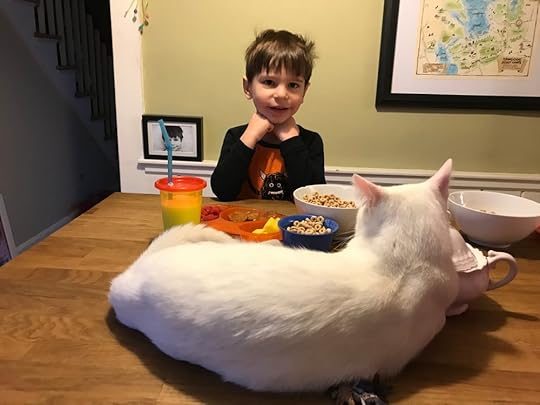
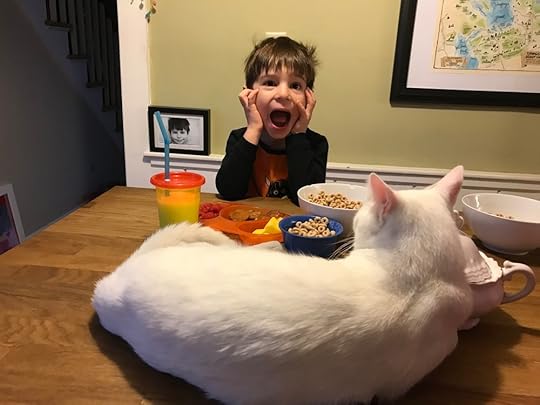
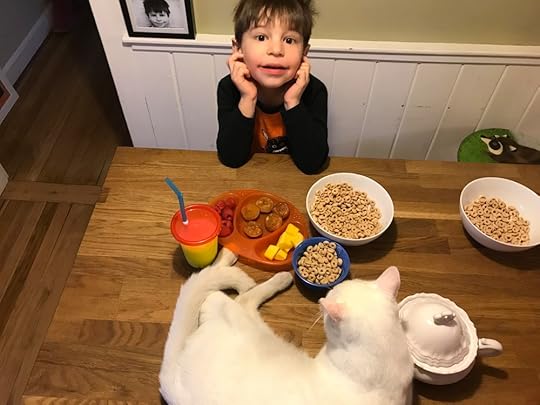
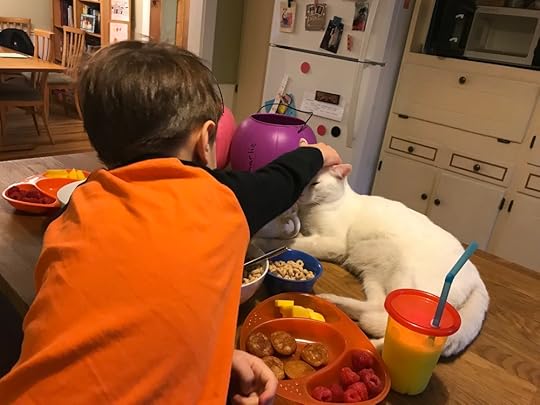
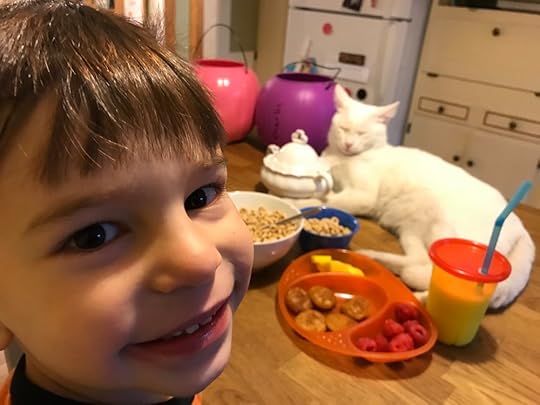
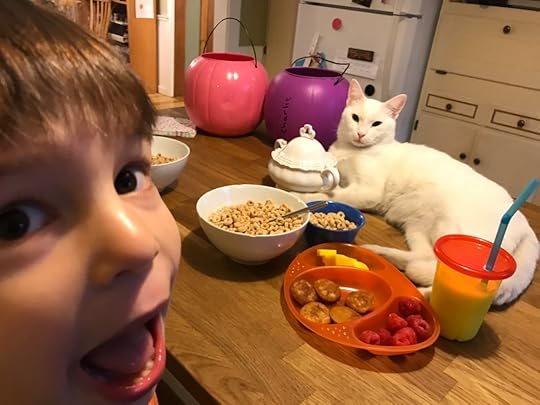
November 20, 2017
Crazy just got crazier (if that was possible)
Trump is always making disturbing, undignified, self-serving statements, but this weekend, he took a decidedly crazy turn (even for him) when he launched a barrage of attacks at the UCLA basketball players who he helped to secure their release, the father of one of these players, and Republican Senator Jeff Flake.
Included in these tweets were the following:
A bizarre reference to himself in the third personA even more bizarre reference to himself as "your favorite President" despite his historically low approval ratings, his loss of the popular vote by more than 3 million votes, and the commonly held understanding that normal human beings should never to refer to themselves as anyone's favorite anything. A middle school-like reference to Republican Senator Jeff Flake as "Jeff Flake(y)"The implication that China's shoplifting penalty of 5-10 years in prison is perfectly appropriateAn expression of regret for helping to secure these American's release from Chinese custody because one of their fathers failed to acknowledge Trump's role in the processCalifornia Congressman Ted Lieu responded to this last week well:
"As public servants, we help people because it is the right thing to do, not because we want to be praised for it. Also, the US President should never wish for Americans to be locked up in a foreign jail."
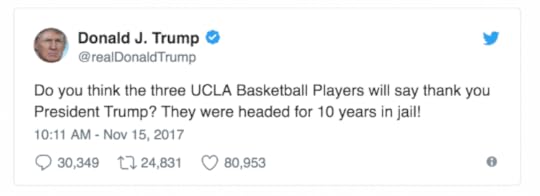
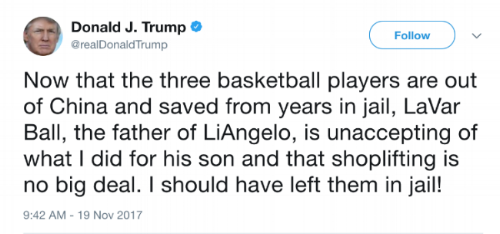
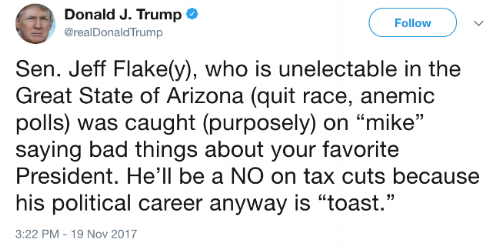
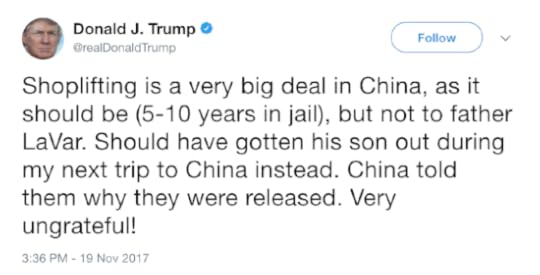
Apparently Bob Mueller's team directed the Justice Department to turn over a broad array of documents this weekend related to Trump's firing of FBI director James Comey and Jeff Sessions decision to recuse himself from the inquiry. So perhaps this bizarre tweet storm was the result of the intense pressure being applied on Trump and his White House in relation to the investigation into the Trump campaign's collusion with Russian operatives.
Or perhaps he's even crazier than we thought.



